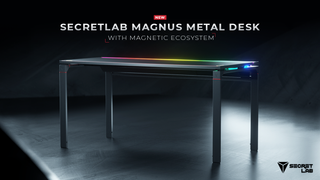Secretlab is releasing an RGB desk to complete your gaming setup
Expanding into the furniture market

You may know Secretlab from its line-up of luxury gaming chairs, frequently seen in the videos of popular Twitch and YouTube stars and used by famous Esports teams. Clearly not just satisfied with chairs, the Singapore-based company is expanding into other areas of gaming furniture with its latest release, the Magnus desk.
Constructed from solid metal, the Magnus measures 59 inches (150cm) across, but there are also plans to release a smaller 47-inch (120cm) version down the line. Not only does the metal construction presumably result in a sturdy build, but magnetic accessories can be used to tidy cables and keep your workstation tidy without permanently sticking anything to the tabletop.
- Not your thing? Check out our list for the best standing desks
- Here are the best gaming chairs you can buy in 2021
- For added variety, here are the best gaming desks for your setup



You may have also noticed from the images but the Magnus also has the option to include a magnetic RGB strip of lighting that connects to the rear of the desk, as well as a desk mat to cover the surface of the tabletop. Dubbed the Magpad Desk Mat, this also fixes magnetically to prevent any distracting shifting, coming in a 'signature stealth' design or emblazoned with the logo of popular Esports teams Team Liquid or Cloud9.
Secretlab described the Magnus as having a modular ecosystem of magnetic accessories, with items like a headphone stand seen in promotional images, though, we don't yet have any prices for the mentioned products or even the desk itself.
This does look to be a great addition to the Secretlab family, so if you're interested in grabbing on for yourself you can register your interest here to kit out your gaming space.
- Follow our guide on how to build your first PC
Get daily insight, inspiration and deals in your inbox
Get the hottest deals available in your inbox plus news, reviews, opinion, analysis and more from the TechRadar team.
Jess is a former TechRadar Computing writer, where she covered all aspects of Mac and PC hardware, including PC gaming and peripherals. She has been interviewed as an industry expert for the BBC, and while her educational background was in prosthetics and model-making, her true love is in tech and she has built numerous desktop computers over the last 10 years for gaming and content creation. Jess is now a journalist at The Verge.
Most Popular


